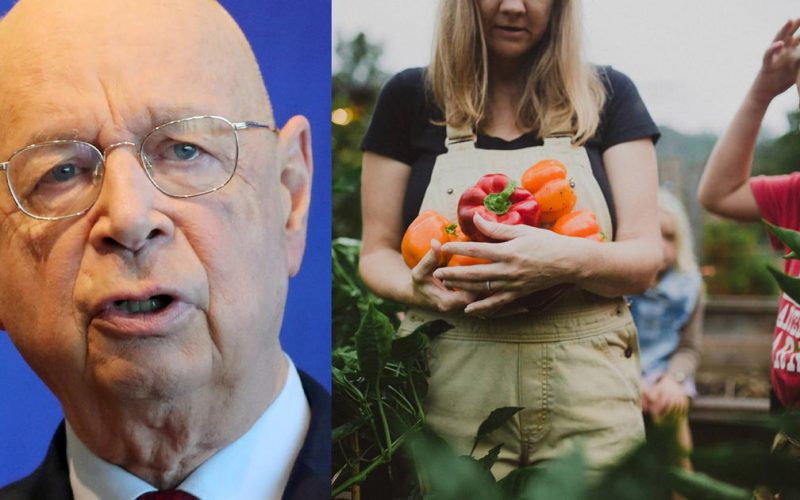WEF Warns Home-Grown Food Causes ‘Climate Change,’ Demands Ban

So-called “experts” at the World Economic Forum (WEF) are warning governments that members of the general public are causing “climate change” by growing their own food at home.
According to a recent WEF study, researchers apparently discovered that home-grown food is “destroying the planet.”
As a result, the WEF and other globalist climate zealots are now demanding that governments intervene and ban individuals from growing their own food in order to “save the planet” from “global warming.”
The research indicated that resorting to garden-to-table produce causes a far greater carbon footprint than conventional agricultural practices, such as rural farms.
This research, conducted by WEF-funded scientists at the University of Michigan, was published in the journal Nature Cities.
The study looked at how much carbon dioxide (CO2) was produced when growing food in different types of urban farms.
It found that, on average, a serving of food made from traditional farms creates 0.07 kilogram (kg) of CO2.
Meanwhile, the impact on the environment is almost five times higher at 0.34kg per portion for individual city gardens, as per the study.
The paper’s first author Jake Hawes said:
“The most significant contributor to carbon emissions on the urban agriculture sites we studied was the infrastructure used to grow the food, from raised beds to garden sheds to pathways, these constructions had a lot of carbon invested in their construction.”
The study recruited 73 urban agriculture sites around the world, including some in Europe, the United States, and the United Kingdom, and conducted a comprehensive life cycle assessment on the site’s infrastructure, irrigation, and supplies.
Hawes and his teammates grouped urban agriculture sites into three categories: individual or family gardens, including allotments; collective gardens, such as community gardens; and larger, commercial-orientated urban farms.
The researchers also found other “hazardous” factors such as poorly managed compost and other synthetic inputs.
They further advised that fruit was 8.6 times more eco-friendly when grown conventionally compared to in a city, whereas vegetables were 5.8 times better for the environment when left to the professionals.
However, they found that some crops have a lower carbon footprint than others and can help green-fingered members of the public make their allotment or garden better for the environment.
Tomatoes and asparagus grown domestically have a lower carbon footprint than conventional farming, they added.
“We find that urban farmers and gardeners can reduce their net impact by focusing on foods that are high-carbon in conventional agriculture,” Hawes said.
“Two examples of this that we identify are greenhouse-grown crops, including many tomatoes, and crops that are often flown in from across the planet, such as asparagus.”
Moreover, two-thirds of the carbon footprint of allotments is created by the garden itself, as per their data. They suggested that gardeners build their site with recycled or second-hand materials, wherever possible, with emissions being cut by more than half if waste from other parts of a city were upcycled for the beds and sheds, for example.
Urban gardeners used to have no qualms about greening their indoor spaces. For one, this reduces city living anxieties and emotional stress. Also, being able to take care of plants inside their offices and homes could be part of interior design and a slight improvement in air quality.
But climate alarmists are not going to give city dwellers peace of mind. According to them, greening indoor spaces can also come at an environmental cost, citing carbon emissions from the trucks that transport plants, plastic pots and synthetic fertilizers. These, they said, are made from petroleum and the harvesting of soil components like peat can “tear up slow-forming habitats.”
Susan Pell, the director of the U.S. Botanic Garden in Washington, D.C., downplayed the narrative and said that individuals should still be able to grow potted plants.
They just need to follow some of her tips to minimize the “environmental harm of indoor gardening.”
These included looking for local plants via garden clubs online to save some money.
She also encouraged gardeners to buy pots, shears, trowels, plant stands, and other tools locally and think about durability, recommending terracotta and ceramic pots.
Pell further recommended opting for sustainable soil and according to her, the least sustainable soil component is peat, a rich brown substance formed from partially decayed plant matter at the bottom of bogs and other wetlands.
Peat, which is a precursor to the formation of coal, releases carbon dioxide when it is harvested.
She said: “It takes hundreds of years if not thousands of years to form. We’re cutting into these peatlands and eventually, they’ll all be harvested.
“Every little thing we do adds up collectively, so if all of us are doing these things, the collective impact is quite large,” she said.
Plus, “the mindful act of trying to be more sustainable in one area of your daily life … helps you to be mindful in other areas.”





















